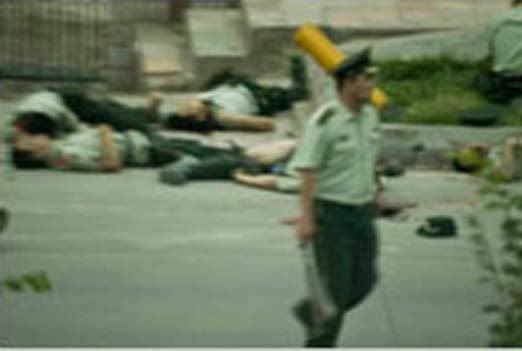Imagining Terrorism: The Kashgar Attack, the Turkestan Islamic Party, and Uyghur Separatism

Enlarged frame from a tourist's photo taken in Kashgar on August 4, 2008.
The Sunday New York Times ran an extremely interesting article that calls into question the entire narrative of Uyghur separatist terrorism that emerged around this summer’s Olympics. The article questioned the official account of what had happened early in the morning of August 4 in the town of Kashgar. According to official reports, three Uyghurs had attacked a column of border guards who were marching down the street early that morning. Authorities claimed that the alleged Uyghur terrorists had ran a truck into the border guards, subsequently attacking them with knives and throwing homemade bombs in the direction of a nearby barracks. According to this Sunday’s Times article, however, three tourists who were staying at a hotel across the street from where the attack transpired report a completely different chain of events and have photographs to prove it.
The tourists note that they were alerted to the commotion when they heard the truck crash, but they never heard any explosives. Perhaps more importantly, they never saw any plain clothed Uyghurs attacking the guards. Rather, they saw other military personnel (or at least people dressed in military uniforms) killing border guards with machetes. The tourists said that they later were interviewed by Chinese policemen asking whether they had seen anything, took any pictures, or sent any emails about the event. The tourists apparently hid their cameras and denied taking photos, but they have now released the photos, including the one above, which depicts a man in military uniform carrying a machete as he walks among the bodies of other military strewn on the road.
Furthermore, this new information should be examined in the context of the general skepticism about the Turkistan Islamic Party (TIP), which released Uyghur language videos this summer claiming to be behind various attacks in Xinjiang during the Olympics (see below). These videos attempted to portray TIP as a sophisticated organization capable of making large truck bombs, yet none of the events in Xinjiang looked to have any of the resources shown off in these videos. Additionally, while the various “terrorist experts” who punditized the Xinjiang attacks suggested to have a plethora of information on this group, demonstrating their sophistication, when pressed on the issue, they usually appeared to in fact have little information not available to your average teenager on youtube (listen to this discussion and view this panel). Those Uyghurs familiar with the Uyghur militant groups that do exist have expressed concern that TIP may also be a fabrication, never having heard of the group before. The latest information that brings into question the authenticity of the attack may support this theory.
Taken all together, one must remain skeptical about what happened in Xinjiang this summer. While one never wants to believe that a government would go to such lengths to murder its own citizens for public relations purposes, such acts cannot be ruled out. Was the Chinese government fabricating Uyghur terrorist attacks merely to raise international sympathy for their security concerns during the Olympics? Maybe, but most China specialists I know make an important point about the Chinese government – it is not monolithic. It should be remembered that the harshest statements about Uyghur terrorism continually emanate from the Xinjiang provincial government, and not from Beijing. Furthermore, many China watchers have noted that regional competition between state officials has increasingly come to define internal Communist Party politics in the country. Perhaps, these attacks were fabricated by Xinjiang provincial officials interested in raising their profile, in justifying their intensification of attacks on Uyghur nationalists, and even seeking additional budgetary funds from Beijing. This, of course, is only speculation, and it is likely that the truth will never be known. What is clear, however, is that the Uyghurs as a people have once again suffered from geo-political machinations. While the international media paid substantial attention to the alleged terrorist attacks this summer, it is unlikely that this new information will see the light beyond the pages of the New York Times. In the meantime, the Xinjiang authorities are continuing to crack down on Uyghurs, and the voice of the Uyghur people remains virtually non-existent in the international debates about China’s rising world prominence. Even more disturbing, the U.S. continues to recognize the Uyghur terrorist threat, likely relying on Chinese intelligence to guide them. If it is true that the Chinese government (on whatever level) staged this attack, it would appear that the Chinese have learned to play the U.S. pretty well...maybe even better than the Pakistanis have.



2 Comments:
I know that this is a serious matter, but the first 15 minutes of the Heritage Foundation panel provides comic relief.
I know that this is a serious matter, but the first 15 minutes of the Heritage Foundation panel provides comic relief
Post a Comment
<< Home